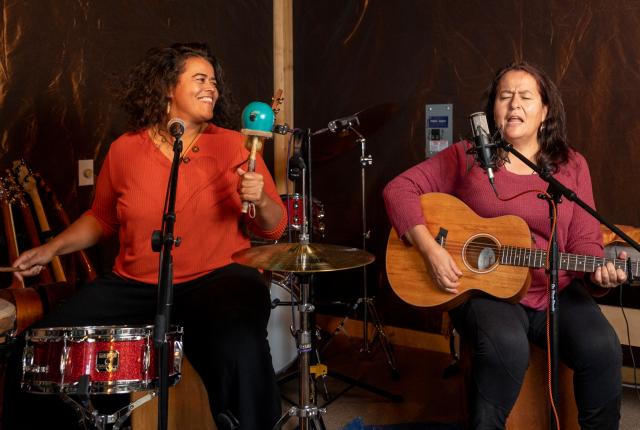Elena Higgins (left) and Tash Terry (right) jam out in their studio. Photograph by Gabriella Marks.
TASH TERRY AND ELENA HIGGINS didn’t make a conscious decision to help the people of Black Mesa, on the Navajo Nation in Arizona, during COVID-19. “It just happened,” Higgins says.
As the pandemic began raging across the United States, the Navajo Nation was hit hard. By mid-April the numbers were spiking, and seven-day averages topped 100 new cases daily in the tribe’s homeland, which spans the Four Corners region of New Mexico, Colorado, Utah, and Arizona. The tribe’s limited running water, internet, housing, and health services contributed to an already distressing situation.
Terry (Diné) and her partner, Higgins (Maori/Samoan)—who co-founded the Santa Fe–based nonprofit IndigenousWays and make up the folk music duo Indigie Femme—grew increasingly concerned. Then a friend from California asked where much-needed supplies might be sent.
“I thought about where I’m from, Black Mountain, right up there on the mountain,” Terry says of her former home in Arizona. (Residents call it both Black Mountain and Black Mesa.) “They were hurting really bad.”
The lack of resources was being compounded by shelves emptied of toilet paper, cleaning supplies, and other necessities in nearby cities. So Terry and Higgins established the Navajo Nation Black Mountain Relief Fund and put out a call for donations through IndigenousWays. Supporters raised $25,000. Thanks to drop-off donations and purchases, they gathered handwashing stations, 55-gallon water drums, paper products, and more.
Over the next two months, Terry and Higgins made four 15-hour round-trips from Santa Fe to the Black Mesa area—each time adding something extra. Then they quarantined for 14 days in between.
Initially, they went in a pickup truck with a rental trailer packed with supply boxes for families. The second trip required three trucks, two trailers, and five volunteers to haul the boxes of toilet paper, coffee, hand towels, canned goods, fruit and vegetables, cleaning supplies, water, and other necessities. A distribution station was set up outside the Black Mesa Chapter House, making it easier for the more than 50 families to drive through and obtain the goods.
On the third trip, they added sunhats, umbrellas, puzzles, reading glasses, and two handwashing stations, as well as a catered a meal for the 30 elders cared for by Community Health Representative Lynn Dean. The final visit brought more handwashing stations and food boxes for families with no running water.
“This pandemic has really changed everybody’s lives,” says Dean. “My community is so isolated. The majority of my elders that I serve still hang on to tradition, like having sheep, goats, cows, horses, and I think that’s what keeps them healthy. It gives them something to wake up to every day. They have something else to care for.”
Higgins and Terry were planning another relief run for the end of October to supply gloves, beanie caps, scarves, flashlights, batteries, first-aid kits, and other necessities before winter.
In addition, the duo used their art to bring together Indigenous musicians and leaders to share music and information. “We were also running two weekly online virtual events and figuring that out—Wisdom Circle and Concert Series, which started on April 1—to keep the communities we serve connected through the arts,” says Higgins.
In their 2015 song “Touch the Earth,” the duo sings, “Take a breath, step outside / Feel the rain / Wet my hands, feel my face / Touch the Earth.”
In today’s context, the lyrics become a prayer to the maternal acknowledgment of our responsibility to care for the gifts humanity has been given.
In getting needed supplies to the Diné on Black Mesa, they helped to fulfill a political, social, and artistic component of that wish. “Sometimes the true medicine is just one-on-one with the individual, listening to them, being with them, and you leave them happy and there’s a shine in their eyes,” says Dean.


